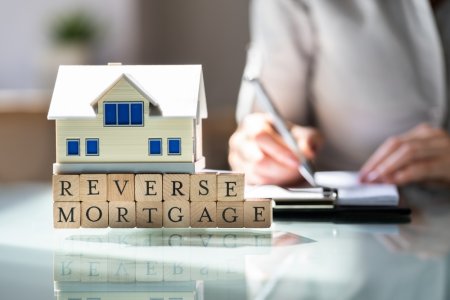Why We Need to Start Talking About Reverse Mortgages
- Replies 27
Taking the step into retirement can feel like a giant leap into the unknown. At the intersection of working life and retirement, many Australians dream of a life of leisure and activity, filled with trips around our great country or journeys beyond its borders, with a life filled with hobbies and small pleasures. Yet, in reality, many Australians find themselves financially restrained, unable to fully enjoy their post-working years to the extent they long to. Breathing life into retirement dreams can, unfortunately, often seem like a distant, unattainable luxury.
More than 62 per cent of Aussies over the age of 65 rely on some form of pension, but it’s alarmingly still not enough to secure a comfortable retirement, according to the Australian Institute of Health and Welfare. The Australian pension alone leaves many scrambling to make ends meet, living below the poverty line without additional income sources.
Recognising this financial shortfall, more and more Australians over sixty are becoming aware that they’ll need to tap into the wealth tied up in their family homes to successfully fund their retirement. However, does the idea of using your family home as a financial resource fill you with dread? If so, you’re certainly not alone!
That’s why it’s about time we turned our attention to discussing all things reverse mortgages, how they work, debunking the common myths, and how the Heartland Reverse Mortgage* product, in particular, has revolutionised the field of reverse mortgages.
Commonly mistaken as a complex financial contraption, a reverse mortgage is quite simple*. Think of it as a companion to a regular home loan, but designed specifically for Aussies aged sixty and over. It allows older Aussies to unlock some of the equity in their property without having to sell and leave their beloved home*. Do keep in mind, members, that a reverse mortgage is something you should explore when you find yourself in a position where you need it and you should do your research. With a Heartland Reverse Mortgage*, independent legal advice is required and financial advice is strongly recommended. You are also encouraged to discuss taking out the loan with your family and Centrelink to check if it will affect any government entitlements.
Did you know, according to The Global Equity Release Roundtable 2020 survey report*, there has been an uptick in home equity release as more than $15 billion is released globally each year? The trend doesn't seem to be slowing down; it's predicted that this number will reach an impressive $50 billion by 2031!
In Australia, when it comes to equity release services, the reverse mortgage is the belle of the ball. Over 90 per cent of Australian retirees wish to remain living in their homes for as long as possible making the reverse mortgage a top-drawer choice in plumping up those retirement finances* while not having to downsize until you are ready.
When you choose a reverse mortgage*, you’re essentially empowering yourself with a cash boost, available whenever you need it throughout your retirement. The primary advantage they offer is the opportunity to continue living in your own home, without having to entertain the thought of selling or downsizing. There’s also no requirement for regular loan repayments, as the debt is settled at the end of the loan, usually through the sale of your property in the future.
Despite the value and convenience they offer, reverse mortgages often find themselves shrouded in mystery and misconceptions. But fear not, members; Heartland Finance* is here to dispel any confusion and ensure you're equipped with all the facts.
Let's bust some of the top myths now:
Myth 1: 'If I take up a reverse mortgage, the lender will own my home.'
Plenty of people are under the misguided belief that a reverse mortgage somehow grants ownership of your home to the lender. This couldn't be further from the truth! Like a regular home loan, the lender simply holds a mortgage over the property. You continue to own your home and live in it for as long as you wish.
Myth 2: 'I'll burden my children with debt if I take a reverse mortgage.'
Again, incorrect. The federal government has put some healthy regulations in place, stipulating a 'no negative equity guarantee' for each loan. This stops you from owing more than the net sale proceeds of your property. So, your children won't inherit debt from your reverse mortgage.
Myth 3: 'Paying regular instalments towards your reverse mortgage is necessary.'
This one's incorrect, too, although it might be hard to believe! While you can choose to make regular payments, it's not obligatory with a reverse mortgage, interest will be added to the month (compounding) – you can pay at the end. Its flexibility allows you to adjust according to your needs.
The cornerstone of the Heartland Reverse Mortgage* is just that: flexibility. They’ve devised a product adaptable to your changing needs as you continue to ripen gracefully with age. This extraordinarily accommodating approach led comparison site InfoChoice to declare Heartland Reverse Mortgages* as the back-to-back winner of the Best Reverse Mortgage award.
Heartland Finance* has helped more than 26,000 Australian seniors unlock the equity in their home to the value of more than $2 billion.
Heartland Finance* borrowers retain the freedom to adapt, personalise, and modify their reverse mortgage to suit changing needs. From the initial advance to setting aside funds in a cash reserve facility for your future needs, to the ability to make unplanned home repairs, Heartland Finance* could be your ‘financial guardian’ in retirement.
Partnering with organisations such as Dementia Australia* and being 100% committed to the Banking and Financial Services Oath is an added testament to Heartland Finance's dedication to its customers*.

Let's get the conversation rolling about reverse mortgages, with Heartland Finance*, helping you lead the charge into a comfortable and fulfilling retirement.
To find out more about reverse mortgages, download your free reverse mortgage guide here.
IMPORTANT NOTICE: Applications are subject to loan approval criteria. Terms, conditions, fees and charges apply. Credit provided by ASF Custodians Pty Ltd (ACN 106 822 780 / Australian Credit Licence No. 386781). Subject to complying with the terms and conditions of the Heartland Reverse Mortgage, you will not owe more than the net sale proceeds of your home and you can keep your home for as long as you choose.
*Please note, members, that this is a sponsored article. All content of ours that has an asterisk next to it means we may get a commission to write an article or post a deal. We do this to assist with the costs of running the SDC. Thank you!
More than 62 per cent of Aussies over the age of 65 rely on some form of pension, but it’s alarmingly still not enough to secure a comfortable retirement, according to the Australian Institute of Health and Welfare. The Australian pension alone leaves many scrambling to make ends meet, living below the poverty line without additional income sources.
Recognising this financial shortfall, more and more Australians over sixty are becoming aware that they’ll need to tap into the wealth tied up in their family homes to successfully fund their retirement. However, does the idea of using your family home as a financial resource fill you with dread? If so, you’re certainly not alone!
That’s why it’s about time we turned our attention to discussing all things reverse mortgages, how they work, debunking the common myths, and how the Heartland Reverse Mortgage* product, in particular, has revolutionised the field of reverse mortgages.
Commonly mistaken as a complex financial contraption, a reverse mortgage is quite simple*. Think of it as a companion to a regular home loan, but designed specifically for Aussies aged sixty and over. It allows older Aussies to unlock some of the equity in their property without having to sell and leave their beloved home*. Do keep in mind, members, that a reverse mortgage is something you should explore when you find yourself in a position where you need it and you should do your research. With a Heartland Reverse Mortgage*, independent legal advice is required and financial advice is strongly recommended. You are also encouraged to discuss taking out the loan with your family and Centrelink to check if it will affect any government entitlements.
Did you know, according to The Global Equity Release Roundtable 2020 survey report*, there has been an uptick in home equity release as more than $15 billion is released globally each year? The trend doesn't seem to be slowing down; it's predicted that this number will reach an impressive $50 billion by 2031!
In Australia, when it comes to equity release services, the reverse mortgage is the belle of the ball. Over 90 per cent of Australian retirees wish to remain living in their homes for as long as possible making the reverse mortgage a top-drawer choice in plumping up those retirement finances* while not having to downsize until you are ready.
When you choose a reverse mortgage*, you’re essentially empowering yourself with a cash boost, available whenever you need it throughout your retirement. The primary advantage they offer is the opportunity to continue living in your own home, without having to entertain the thought of selling or downsizing. There’s also no requirement for regular loan repayments, as the debt is settled at the end of the loan, usually through the sale of your property in the future.
Despite the value and convenience they offer, reverse mortgages often find themselves shrouded in mystery and misconceptions. But fear not, members; Heartland Finance* is here to dispel any confusion and ensure you're equipped with all the facts.
Let's bust some of the top myths now:
Myth 1: 'If I take up a reverse mortgage, the lender will own my home.'
Plenty of people are under the misguided belief that a reverse mortgage somehow grants ownership of your home to the lender. This couldn't be further from the truth! Like a regular home loan, the lender simply holds a mortgage over the property. You continue to own your home and live in it for as long as you wish.
Myth 2: 'I'll burden my children with debt if I take a reverse mortgage.'
Again, incorrect. The federal government has put some healthy regulations in place, stipulating a 'no negative equity guarantee' for each loan. This stops you from owing more than the net sale proceeds of your property. So, your children won't inherit debt from your reverse mortgage.
Myth 3: 'Paying regular instalments towards your reverse mortgage is necessary.'
This one's incorrect, too, although it might be hard to believe! While you can choose to make regular payments, it's not obligatory with a reverse mortgage, interest will be added to the month (compounding) – you can pay at the end. Its flexibility allows you to adjust according to your needs.
The cornerstone of the Heartland Reverse Mortgage* is just that: flexibility. They’ve devised a product adaptable to your changing needs as you continue to ripen gracefully with age. This extraordinarily accommodating approach led comparison site InfoChoice to declare Heartland Reverse Mortgages* as the back-to-back winner of the Best Reverse Mortgage award.
Heartland Finance* has helped more than 26,000 Australian seniors unlock the equity in their home to the value of more than $2 billion.
Heartland Finance* borrowers retain the freedom to adapt, personalise, and modify their reverse mortgage to suit changing needs. From the initial advance to setting aside funds in a cash reserve facility for your future needs, to the ability to make unplanned home repairs, Heartland Finance* could be your ‘financial guardian’ in retirement.
Partnering with organisations such as Dementia Australia* and being 100% committed to the Banking and Financial Services Oath is an added testament to Heartland Finance's dedication to its customers*.
Key Takeaways
- Reverse mortgages* allow Australians aged sixty and over to release some of the equity in their property to boost retirement funding without selling their home.
- Heartland Reverse Mortgages* offer flexibility, allowing penalty-free loan repayments, flexible options for drawdowns, and cash reserves (standard discharge fee at end of loan). It has been recognised by comparison site InfoChoice as the Best Reverse Mortgage in 2020.
- There are common misconceptions about reverse mortgages, including that the lender owns the home and that children will inherit debt; both of these are incorrect.
- The amount that can be borrowed with a Heartland Reverse Mortgage* depends on the borrower's age and the company also offers an equity protection option to protect up to 50 per cent of the net sale proceeds of the home – if you choose this option though the amount available to borrow reduces proportionally.
Let's get the conversation rolling about reverse mortgages, with Heartland Finance*, helping you lead the charge into a comfortable and fulfilling retirement.
To find out more about reverse mortgages, download your free reverse mortgage guide here.
IMPORTANT NOTICE: Applications are subject to loan approval criteria. Terms, conditions, fees and charges apply. Credit provided by ASF Custodians Pty Ltd (ACN 106 822 780 / Australian Credit Licence No. 386781). Subject to complying with the terms and conditions of the Heartland Reverse Mortgage, you will not owe more than the net sale proceeds of your home and you can keep your home for as long as you choose.
*Please note, members, that this is a sponsored article. All content of ours that has an asterisk next to it means we may get a commission to write an article or post a deal. We do this to assist with the costs of running the SDC. Thank you!









